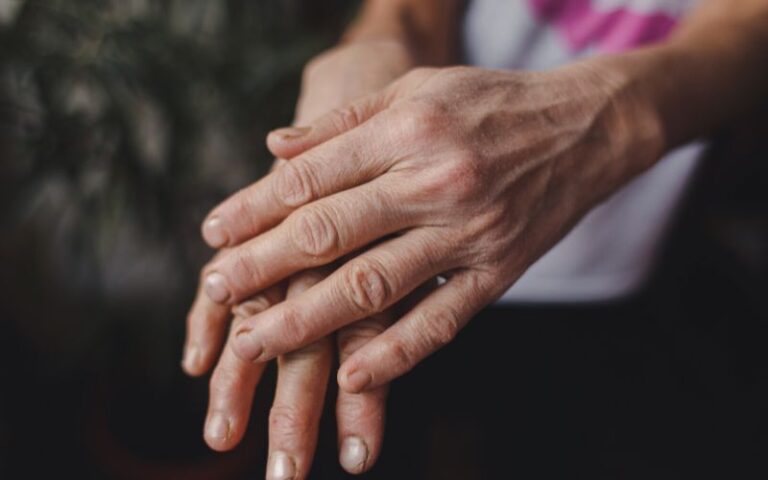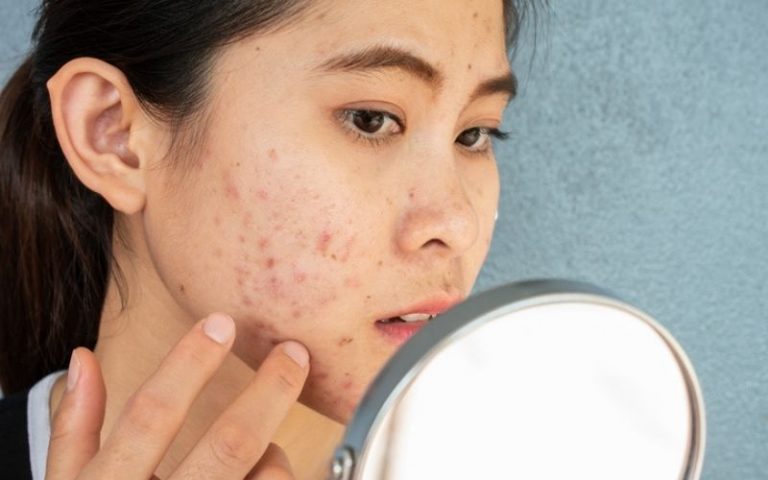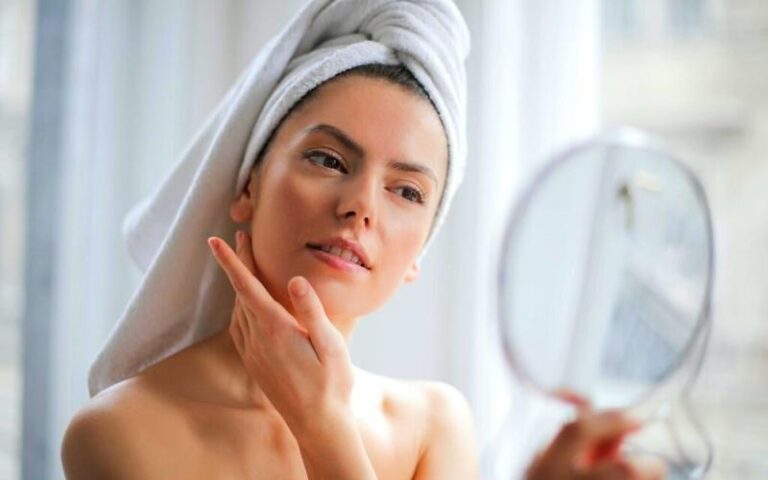Skincare Myths: Top 9 That Are Hurting Your Skin

Don’t let skincare myths ruin your beautiful face.
With all the hype around random Tiktok skincare hacks like lemon juice for acne scars, potato facials, and other enticing (yet questionable) remedies, which ones are myths that you should avoid?
Regardless of your skin type, we’re gonna dive into the top 9 skincare myths that’ll definitely save you from a few future breakouts or some other type of skin care nightmare!
Skincare myths #1: Sunscreen causes acne
Some sunscreens are heavy and greasy, making it easy to believe the common myths that claim they clog pores and cause acne.
But, the Skin Cancer Foundation warns of the increased intensity of ultraviolet rays (UV rays), even on cloudy days.
A recent study by the American Academy of Dermatology (AAD) showed that, after a long day of sun exposure, individuals had a higher risk of sunburn, wrinkles, and skin cancer.
Scientific studies show that harmful UV rays expose the skin to ultraviolet radiation.
This can cause sun damage like brown spots, moles, and freckles to form on all parts of the body, especially if you spend a lot of time in the sun.
How to choose a good sunscreen
The key to choosing effective sunscreens is finding a broad-spectrum sunscreen for your skin type, choosing UV blocking protection for acne-prone skin if you breakout easily.
Pay close attention to the sun protection factor (SPF), making sure your choose SPF protection of at least 30.
Also, choose a sunscreen with titanium dioxide that protects against both types of the sun’s rays, UVA and UVB rays.
These are the damaging rays responsible for UV radiation that cause diseases like melanoma and other skin cancers, as well as premature aging and hyperpigmentation.
You can enjoy a daily dose of vitamin D and reduce your skin cancer risk as long as you increase your level of protection.
Slather up with spf sun protection, wear protective clothing, sunglasses, and limit the amount of time in direct sunlight.
Skincare myths #2: Oily skin doesn’t need moisturizer
Moisturizer is a must, no matter what your skin type.
With daily application, it gives the skin a boost of hydration and prevents dry skin and wrinkles.
While it might sound counterintuitive, oily skin has a lack of moisture, often overproducing natural oils like sebum in the skin.
Dermatologists in the U.S. recommended using a daily moisturizer that has hyaluronic acid or retinol to balance out oils and keep the face quenched all day long, slowing the aging process.
Before using a weightless cream moisturizer on the face, use a toner that controls oil production to prevent excess oil from building up throughout the day.
Skincare myths #3: Lemon juice brightens acne scarring
For those in love with natural remedies, lemon seems like a godsend.
It’s packed with vitamin C and has a high PH that has the power to brighten up a dull complexion, acting as a natural exfoliator that sluffs off dead skin cells and other debris.
While the acid in lemon juice is a good thing for discoloration and dark spots, it is an irritant, potentially causing inflammation to sensitive skin.
If you struggle with scars and dark spots from acne breakouts or a skin allergy, you could try a non-invasive laser treatment, peels, or a facial aimed at reducing redness.
Or, go for a gentle exfoliant that won’t sacrifice skin’s health.
Though it’s trendy to go all-natural, use caution before trying out this skincare myth.
Skincare myths #4: Getting a sun tan is healthy for skin
Sun gives the body a dose of vitamin D and works wonders for the complexion.
When we’re by the pool on a sunny day, we feel beautiful and bronze, getting the perfect golden pigment.
Although tans are all the buzz, tanning beds and sun bathing expose the skin to UV rays that could cause skin damage.
Possible damage from uv exposure includes fine lines, wrinkles, and, in some cases, skin cancer or melanoma.
The best way to get a healthy tan while taking care of your skin is to skip the tanning booth and choose a spray tan.
Go for a tan salon that uses a safer alternative that has FDA-approved active ingredients, like DHA, that increase melanin.
If you choose the sun, it’s an important thing to get a base tan first.
After that, lather on sunscreen lotion with higher SPF and UV protection from both UVB and UVA rays, preventing sunburns, skin cancer, and melanoma.
Skincare myths #5: Diet has no effect on skin health
They say you are what you eat and, when it comes to skin, the old wives’ tale couldn’t be more true.
Our diet effects everything from our immune system, our hormones, appearance of cellulite, and our skin.
That’s why it’s a good idea to skip the junk food and choose food that’s good for your body.
The American Drug Administration (ADA) claims that the more green, leafy vegetables, varied fruits, and healthy proteins we eat, the more our skin glows.
It’s also good to be mindful of what you drink, ditching the alcohol and caffeine and increasing water intake.
Try to hit eight glasses of water a day to eliminate dehydration and help the kidneys filter toxins.
Apart from watching what you eat and drink, it’s recommended to take supplements with natural ingredients for skin problems like dryness and acne.
It’s a great idea to make these a part of your daily routine.
Skincare myths #6: Pore strips are good for blackheads
It’s a common misconception that pore strips are the perfect remedy for blackheads.
It’s easy to believe this skin care myth, seeing bits and pieces coming out of your skin right before you eyes.
However, blackheads shouldn’t be ripped out of the surface of the skin.
The ripping effect not only hurts but can be irritating to skin and cause inflammation or irritation to sensitive skin.
Instead, try an activated charcoal facial or steam hot water letting the steam soften up pores.
Follow up with cold water to help release buildup from pores and finish off with a gentle cleanser and a lightweight cream moisturizer.
Skincare myths #7: Anti aging is only for old people
In your 20s, your skin is plump, hydrated, and healthy.
That’s why it’s easy to believe skincare myths claiming anti-aging routines are only for old people.
While it doesn’t seem urgent to get on a skincare routine with cleanser, toner, eye cream, and moisturizer, you’re losing calcium, collagen and hydration, welcoming the appearance of wrinkles.
What you do in your 20s, shows up in the 30s and, without caring for skin and limiting exposure to sunlight, you’re at risk for early signs of aging.
Top dermatology experts in the United States claim that your late 20s to early 30s is the perfect time to try botox and invest in skin care products filled with spf and facials that protect and heal the skin cells.
Even if you’ve got great genetics, it’s never easy to slow the appearance of fine lines and wrinkles, thinking of the long term results.
Hopping on a routine that protects the skin from sun exposure and dryness will give you flawless skin, increase your moisture levels, and even out skin tone from your late 30s and beyond.
Skincare myths #8: Skincare products have to be expensive to be quality
One of the common skincare myths has many believe that the more expensive the product, the more effective.
The good news is, there are several over the counter products that work better than an expensive product.
Dermatologists claim that this costly misconception is all over the beauty industry, not just skincare.
The truth is, beauty and skincare products don’t need to be expensive to be effective.
What matters are the ingredients and their concentrations in skincare products.
Quality ingredients such as hyaluronic acid, retinoids (retinol), or products with enzymes, antioxidants, and glycolic acid are all over the market at affordable prices.
When searching for the right product, facial, or treatment go for a natural product with powerful active ingredients, searching for high concentrations.
Skincare myths #9: Toothpaste is good for acne
You may have heard of toothpaste used as as spot treatment for pimples.
Some claim that this popular skincare myth is a miracle that clears skin overnight by drying out pimples but there is no such thing.
Toothpaste is not good for skin that’s acne-prone and contains fluoride that could irritate sensitive skin.
Acne is a common skin condition and there are a lot of products that are affordable and work much better than toothpaste such as benzoyl peroxide or tea tree oil.
Your best bet to avoid skin irritation and swelling is to choose a face wash or scrub for acne-prone skin and drinking a lot of water to flush out toxins.
The verdict
Skincare myths come from many places, passing from person to person.
Now, with the help of social media, these common myths are easier to come by and often appear credible.
While some influencers swear by them, it’s good to know the basics of proper skin care and the difference between skin facts and myths so that you can achieve healthy skin and reduce your risk of skin cancer.
Invest in skin products and cosmetics with spf protection and address your skin concerns with a dermatologist, relying on what really works.
Instead of taking your skin on a wild ride, know what works and and what doesn’t, taking advice from the experts.





